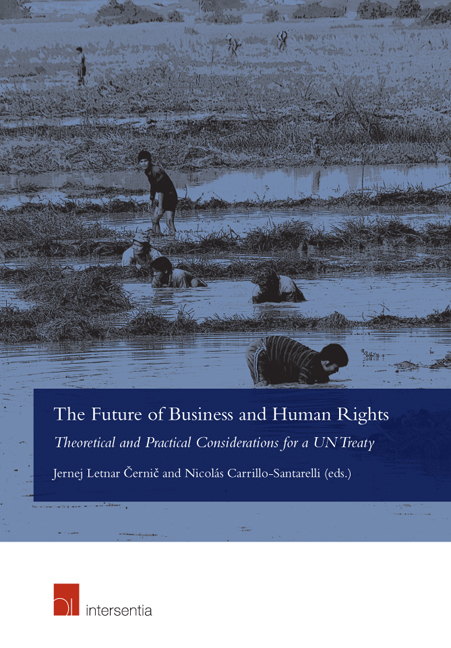Book contents
- Frontmatter
- Dedication
- Acknowledgements
- Contents
- About the Contributors
- Introduction
- Part I The Convenience and Possibility of Adopting a Treaty on Business and Human Rights
- Part II Critical Analyses Of A Treaty On Business And Human Rights
- Part III Regional Approaches
- PART IV Lessons from other Regimes of International Law
- Conclusion
- Index
Conclusion
Published online by Cambridge University Press: 11 October 2018
- Frontmatter
- Dedication
- Acknowledgements
- Contents
- About the Contributors
- Introduction
- Part I The Convenience and Possibility of Adopting a Treaty on Business and Human Rights
- Part II Critical Analyses Of A Treaty On Business And Human Rights
- Part III Regional Approaches
- PART IV Lessons from other Regimes of International Law
- Conclusion
- Index
Summary
What the future of business and human rights will be has been one of the most exciting debates in today's global arena. Victims from all parts of the world have been demanding greater corporate accountability for human rights and more effective and efficient access to justice. Rather than presenting one single conclusion reflecting an agreement of the authors of the different chapters on some ideas, we consider it appropriate to acknowledge that the different perspectives found therein reflect the ongoing diplomatic and academic discussions on central aspects, ranging from questions as to whether it is possible or necessary to adopt the proposed treaty on business and human rights, to those related to the content that such instrument or alternative sources of hard or soft law should include, which categories of corporations they ought to address, and which developments taking place in other normative regimes or regional systems can inspire normative processes. It is necessary to acknowledge and allow for a pluralistic debate on the future of business and human rights.
Nevertheless, such disagreements should not be construed as absolute, insofar as there is a public consensus that whatever normative development ends up occurring and succeeding – be it new negotiations or simply the concrete implementation of the UN Guiding Principles – the protection of individuals from corporate abuses should be at the centre of that dynamic and its underlying policies and aspirations.
Granted, some actors, including perhaps those representing corporate and economic interests from certain State delegations and other subjects, may have an interest in thwarting a treaty negotiation without openly expressing why, while publicly declaring that they deem a treaty inconvenient for a variety of fabricated reasons. Some have even argued that the treaty process has undermined the global ‘consensus’ reached at the time of the adoption of the Guiding Principles. But others legitimately and honestly consider that the adoption of a treaty could hinder or weaken existing guarantees and their natural evolution.
Conversely, some argue that the regulation of direct corporate obligations, or a clarification of State duties – extraterritorial and otherwise –, are necessary for the protection of individuals to be strengthened. This is so given the gaps and limitations of prevalent contemporary human rights assumptions, still largely based as they are on State obligations and voluntary corporate standards.
- Type
- Chapter
- Information
- The Future of Business and Human RightsTheoretical and Practical Considerations for a UN Treaty, pp. 299 - 306Publisher: IntersentiaPrint publication year: 2018



